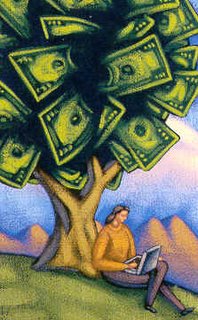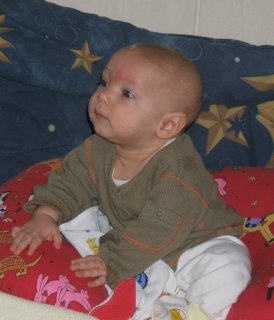 Money.
Finance.
Cash flow.
...words that strike terror, guilt, and fear, into the hearts of most of us. We all dread tax time, most of us have recordkeeping systems that aren't systematic at all, we take whatever insurance our employer offers us (or whatever we can or can't afford on our own) and don't even think about whether it's the correct amount. If we're lucky, we've got a 401(k) that we're saving into, but the majority of us have no idea what we're actually invested in or what horrors we're perpetrating on the world in the interest of stockholder profits.... the list goes on, and what it spells is "denial".
It's interesting that we have all these cringes built-in about finance, yet the majority of us received little to no financial education. We're beating ourselves up for being illiterate. Everyone can get behind programs to help people learn to read, yet when the program's to help us figure out money, we get all freaky. Well, it's time to stop.
Scott Noelle, my favorite parenting guru, coined the phrase "the healing gap". His explanation of the phenomenon:
Money.
Finance.
Cash flow.
...words that strike terror, guilt, and fear, into the hearts of most of us. We all dread tax time, most of us have recordkeeping systems that aren't systematic at all, we take whatever insurance our employer offers us (or whatever we can or can't afford on our own) and don't even think about whether it's the correct amount. If we're lucky, we've got a 401(k) that we're saving into, but the majority of us have no idea what we're actually invested in or what horrors we're perpetrating on the world in the interest of stockholder profits.... the list goes on, and what it spells is "denial".
It's interesting that we have all these cringes built-in about finance, yet the majority of us received little to no financial education. We're beating ourselves up for being illiterate. Everyone can get behind programs to help people learn to read, yet when the program's to help us figure out money, we get all freaky. Well, it's time to stop.
Scott Noelle, my favorite parenting guru, coined the phrase "the healing gap". His explanation of the phenomenon:
How could I raise a child responsibly when I was still recovering from my own troubled childhood?
That feeling, over seven years ago, came from an awareness of what I now call the healing gap, a phenomenon that arises when a person consciously seeks a healthier path than the one he or she is currently on. In parenthood, it's the gap between the healthy parenting ideas you embrace consciously and what you're actually capable of doing, here and now.
Real-life parenting does not emerge solely from the parent's conscious intentions; it involves the whole person — mind, body, emotions and spirit — as well as the social and cultural context in which it takes place. In other words, it's easy to change your mind, but implementing a change in your whole self is far more difficult, especially when going against the grain of society and culture.
The gap between parenting theory and practice is filled with "stuff": each parent's unique collection of fears, attachments, emotional wounds, unmet needs and obsolete strategies — plus external, sociocultural pressures — that impede our efforts to do what we believe is best.
I use Scott's wisdom all the time, when trying to cut my perfectionist self some slack when I blow it with the boys. And while working through my own finance baggage with my pal
Angela, I realized that Scott's gap exists every bit as much for money as it does for parenting. Wading through finance information, you get routinely smacked with fears, attachments, emotional wounds, unmet needs, and oh man, the obsolete strategies. And of course, heading into the holiday season as we are, the sociocultural pressures to behave badly financially are all around us.
I'll be the first to admit my overwhelming ignorance. Hi, my name's Laureen, and I'm financially ignorant. There. I did it. =) And since I hate being ignorant, I'm embarking on an adventure of self-education with regards to things financial. And you're all welcome to come along. I'll be reviewing websites and books, eNewsletters and stock trading sites. I will take the proverbial hit, blundering around the financial world, and asking all the questions we're all generally too embarassed, or too distracted, or too clueless, to ask ourselves. And then I'll report back with findings. They'll be posted here with the same heading, Financing the Gap (or FTG), and I'll make sure they link correctly in the right nav.
It's probably important to say, up front, that this is NOT about advice, it's about highlighting some of the best and coolest places to go to get the information to make the best decisions for you. The more I read, the more I understand that there is not one ultimate financial truth, there are different perfect answers for different people, and it's only by being immersed in the material that you'll learn enough to figure out what your truth is.
I'm hoping that this will generate discussion, and further questioning (I can't really be expected to think of every question, can I?) And this is not just a stunt to drive traffic to my blog, although that will be a nice side-effect. Truth is, the thing that has finally gotten me to quit dodging and start facing the wild world of cash flow is that I want to give my sons a financial legacy of something other than debt and chaos. I want them to understand money, to not be a slave to it, to not be prey to unscrupulous debt-mongers and salesmen and godforbid analyists. I want them to be able to live off their investments, and to enjoy the life fantastic, without falling prey to the habits that doom most of us to eternal wage-slavery.
I'm assuming that, as is usually true with organic research, my path will meander with my interests, so I won't commit to any particular direction or topic or godforbid, outline. Right now, here are some of my thoughts. Feel free to leap in with suggestions:
- Basic personal finance education books -- Suze Orman, Eric Tyson, Robert Kiyosaki, Charles Givens. Controversies, contradictions, and chapter titles.
- Web resources -- links, forums, articles
- Finance in the media
- Lingo
- Vehicles -- why would you want, say, eTrade over eVision, or would you want them at all?
- Tips n Tricks, Hidden Money and Money Found
So away we go. Hope you all enjoy the ride....







